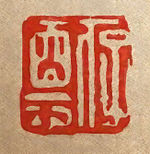Hu Zhengyan
| Hu Zhengyan | |||||||||||||||||||||||||||
|---|---|---|---|---|---|---|---|---|---|---|---|---|---|---|---|---|---|---|---|---|---|---|---|---|---|---|---|
| Chinese name | |||||||||||||||||||||||||||
| Chinese | 胡正言 | ||||||||||||||||||||||||||
|
|||||||||||||||||||||||||||
| Courtesy name | |||||||||||||||||||||||||||
| Traditional Chinese | 曰從 | ||||||||||||||||||||||||||
| Simplified Chinese | 曰从 | ||||||||||||||||||||||||||
|
|||||||||||||||||||||||||||

One of Hu Zhengyan's personal seals
|
|||||||||||||||||||||||||||
| Born |
c. 1584 Xiuning, China |
||||||||||||||||||||||||||
| Died |
c. 1674 Nanjing, China |
||||||||||||||||||||||||||
| Other names | Hu Yuecong, Hu Cheng-yen | ||||||||||||||||||||||||||
| Occupation | Publisher, artist, seal-carver | ||||||||||||||||||||||||||
| Known for | Colour woodblock printing | ||||||||||||||||||||||||||
| Notable work | Ten Bamboo Studio Manual | ||||||||||||||||||||||||||
| Transcriptions | |
|---|---|
| Standard Mandarin | |
| Hanyu Pinyin | Hú Zhèngyán |
| Gwoyeu Romatzyh | Hwu Jenq-yan |
| Wade–Giles | Hu2 Cheng4-yen2 |
| IPA | [xǔ ʈʂə̂ŋ.jɛ̌n] |
| Wu | |
| Romanization | ɦou tsen-nyĩ |
| Yue: Cantonese | |
| Yale Romanization | Wùh Jing-yìhn |
| Jyutping | Wu4 Zing3-jin4 |
| Southern Min | |
| Tâi-lô | Ôo Tsiànn-giân |
| Transcriptions | |
|---|---|
| Standard Mandarin | |
| Hanyu Pinyin | Yuēcóng |
| Wade–Giles | Yüeh1-ts'ung2 |
Hu Zhengyan (Chinese: 胡正言; c. 1584 – 1674) was a Chinese artist, printmaker and publisher. He worked in calligraphy, traditional Chinese painting, and seal-carving, but was primarily a publisher, producing academic texts as well as records of his own work.
Hu lived in Nanjing during the transition from the Ming dynasty to the Qing dynasty. A Ming loyalist, he was offered a position at the rump court of the Hongguang Emperor, but declined the post, and never held anything more than minor political office. He did, however, design the Hongguang Emperor's personal seal, and his loyalty to the dynasty was such that he largely retired from society after the emperor's capture and death in 1645. He owned and operated an academic publishing house called the Ten Bamboo Studio, in which he practised various multi-colour printing and embossing techniques, and he employed several members of his family in this enterprise. Hu's work at the Ten Bamboo Studio pioneered new techniques in colour printmaking, leading to delicate gradations of colour which were not previously achievable in this art form.
Hu is best known for his manual of painting entitled The Ten Bamboo Studio Manual of Painting and Calligraphy, an artist's primer which remained in print for around 200 years. His studio also published seal catalogues, academic and medical texts, books on poetry, and decorative writing papers. Many of these were edited and prefaced by Hu and his brothers.
Hu was born in Xiuning County, Anhui Province in 1584 or early 1585. Both his father and elder brother Zhengxin (正心, art name Wusuo, 無所) were physicians, and after he turned 30 he travelled with them while they practised medicine in the areas around Lu'an and Huoshan. It is commonly stated that Zhengyan himself was also a doctor, though the earliest sources attesting to this occur only in the second half of the 19th century.
...
Wikipedia
